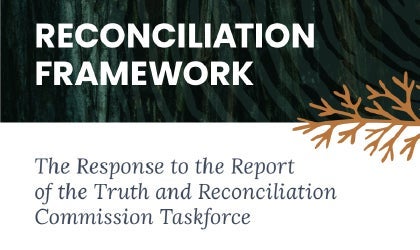Over the last several years, the Libraries have been taking tangible steps to contribute to the reconciliation work happening at the University of Waterloo. Recent projects have included the creation of an Indigenous Research Guide and increasing our number of pre-approved smudging spaces in our libraries. Kevin George, the Library’s associate director, Indigenous initiatives, has been actively working with our collections team to expand our Indigenous book collection and our cataloguing team has been updating language in our catalogues.
On this National Day for Truth and Reconciliation, we wanted to shine a spotlight on the ongoing work of our Special Collections & Archives (SCA) team.
A call to action
Throughout the history of Canada, archives and museums have collected records that document the lives of First Nations, Métis and Inuit people without their meaningful consent. Professional practice has included the use of racist language to describe collections, allowing non-Indigenous researchers access to sacred or ceremonial records and denying Indigenous people access to records that impact their efforts toward redress.
The 2015 Truth and Reconciliation Commission of Canada: Calls to Action report included specific actions for Canadian archives to begin the work towards reconciliation (call to action 70).

The Steering Committee on Canadian Archives established a taskforce to develop a framework for responding to this call to action. After five years of research, relationship building and collaboration across the Canadian archival profession with First Nations, Métis and Inuit partners, a Reconciliation Framework was published, identifying a transformative path forward for the archival profession.
A way forward
SCA is committed to supporting reconciliation work within our campus community and endorses the Steering Committee on Canadian Archives’ Reconciliation Framework and the principles it establishes to guide our work.
First steps are already underway, including ongoing updates to language in archival descriptions and adding content warnings; reviewing our collections policy; and re-focusing work being done on existing collections to highlight the diversity of our communities, from doing additional research to name unidentified people in images to what we prioritize for digitization.
If you would like to learn more about SCA’s commitments to reconciliation and our next steps, read the SCA blog for further information.